Lucy Forbes talks about directing This Is Going To Hurt
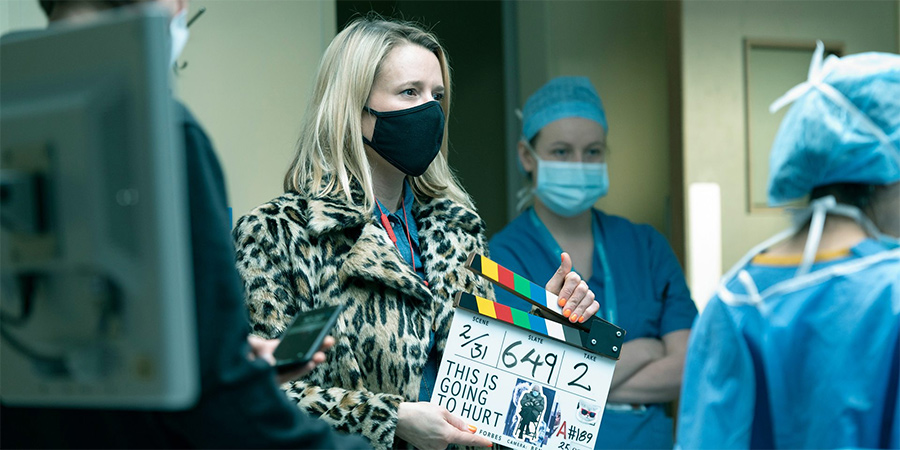
Director Lucy Forbes talks about bringing Adam Kay's This Is Going To Hurt scripts to the screen.
What was it about the project that first made you want to be part of it? Were you aware of the book before you were approached about the adaptation?
I was aware of the book. But I hadn't read it, if I'm completely honest, but read it to prepare for the meeting and I was absolutely blown away. Mainly, though, I was blown away by the scripts. Comedy and drama walk hand in hand, they're the same thing, and as a director, I like to take the audience on a journey. The first script, especially, was such an absolute rollercoaster of comedy and emotion. It was a story that I was absolutely desperate to tell.
The show feels very different to lots of other hospital dramas and comedies. How did you approach this as director?
For me, the most important thing was that it didn't feel like anything else, yes, it's a hospital drama, but I didn't want to it to feel like one! It needed to feel real and raw and messy like a hospital and like the lives of the people and patients that exist within it. It's Adam story so everything is told from him perspective, I wanted to strap the audience in next to him and take them for the ride, I wanted them to feel like they were there living through it, rather than observers to his story.
Everyone knows what the NHS looks like, all of us have experienced it. So it very much had to feel like the NHS but at the same time, I wanted to elevate it and make it feel cinematic and beautiful.
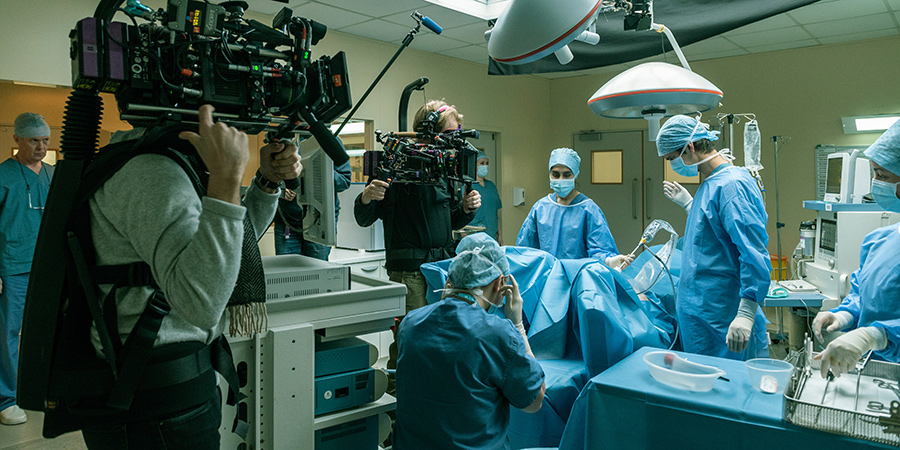
What was it like working with the rest of the creative team? What did you do to make sure the show feels unique?
I wanted to avoid an overly lit, whitewashed sort of hospital, so we approached it in a very filmic way and used available and practical light as much as possible. We shot it handheld so we could live and breathe and react to the story that was playing out in front of us. We had the incredible cinematographer Benedict Spence, who had made it look beautiful and found so much beauty in the mundane.
Colour was really important to me, because ultimately a hospital is a very recognisable place, but we worked hard to give it its own look without breaking the spell and keeping it authentic. For example, Emma Rees our costume designer created our own shade of scrubs, so they felt familiar but they fitted into the colour palette that we wanted.
I had an incredibly talented team of Heads of Department who worked very hard. Our design team, headed by Dick Lunn and Anna Kasabova, built and dressed a fully working hospital ward from scratch (in the middle of a pandemic!) and Niamh Morrison, our hair and make-up designer, did the most incredible job of not only making Ben Whishaw look completely knackered the whole time, but also finding the perfect looks for our day players to help sell their characters instantly.
How was it working with Adam on such a personal project?
What's great about working with Adam, is that you are working next to the man that has experienced it all, and who really, really understands the story and what doctors and medical staff go through. He has such a clear understanding because it's his personal story. And on top of that he's incredibly funny. He was incredibly passionate about telling the story authentically but also in detail - the detail was incredibly important to Adam. I'm a detail person as well - every single tiny decision matters, down to what colour the file is that they write the patient's notes in. All of those decisions are so important to build the world, and he felt the same way. Also, it was a privilege to be able to tell his story. And it is a privilege to be able to tell the story of junior doctors in the NHS.
The show feels like a really powerful, authentic glimpse into the reality of working on the frontline in the NHS, which also feels incredibly resonant. How much did that inform your approach to the project, as director?
The most important thing to me was that it felt real and it felt authentic. And we didn't hold back on anything. Everyone understands what the NHS is, in terms of their personal experience of it. What they don't understand, and what we don't talk about enough, is the doctors' experience of the NHS, and who cares for the people that care for us. And that was the thing that was important for me to show, warts and all.
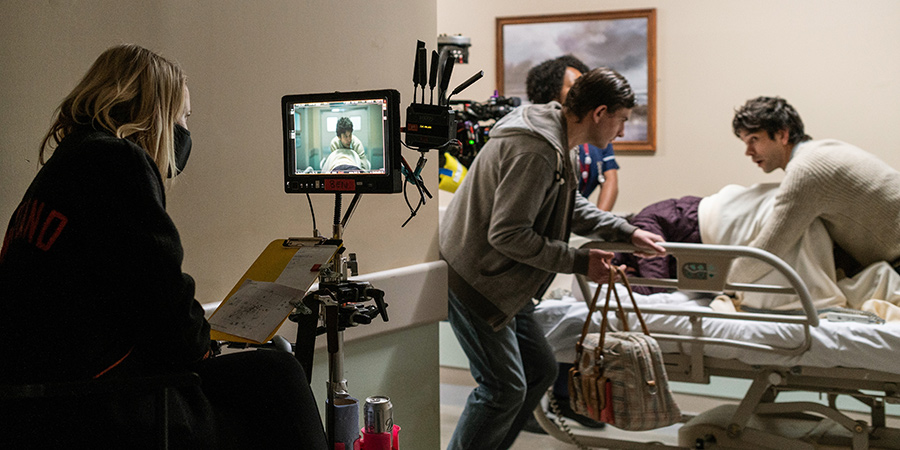
What do you hope audiences take away from watching the show either? What do you hope it will mean to people?
I want them to strap themselves in a go on the rollercoaster ride, to laugh and cry and experience what it's like working on an Obs & Gynae ward, warts and all. But then also I want them to see, one, how amazing the NHS is, and two, how much it and the people that work within it, need more care, respect, and funding.
There are some incredibly profound and sad moments that lie alongside proper laugh-out-loud ridiculous moments too. As director, is it challenging to tread this line? And how did you ensure that these two extremes of experience sit so well, side by side?
Comedy and drama walk hand in hand, they're the same thing. It's all about pace and timing, and pausing and letting those moments hit and breathe and exist together. If you find the truth in it, then those moments come naturally. As soon as you push the comedy or the drama in a way that's not truthful or authentic, that's when those moments clang. Because our lives aren't one big joke or one big drama. They're a mixture between everything, and we're all very experienced in dealing with those mixes of emotions.
I wanted it to feel real, and if you make it feel real, then comedy and drama can exist in the same space. There's also something about that gallows humour shared by all of those frontline workers, whether it's doctors, paramedics, firefighters, police officers, it just feels so authentic. You have to embrace that. That is a complete survival technique that I found across the board with all the medical advisors that we interacted with.
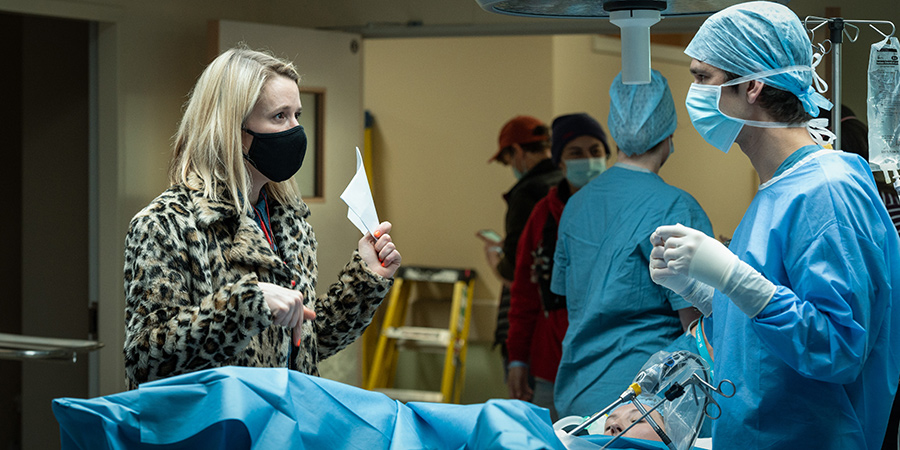
What was it like working with Ben Whishaw as Adam?
Ben Whishaw is one of the most talented actors I've ever worked with. He's an incredibly intelligent, thoughtful and empathic performer, and balanced the comedy and drama so masterfully. He made what was ultimately on paper, a very complicated, sometimes hateful character, one that you could empathise with, and that's no mean feat. He makes you feel for him despite himself. Ben has made it all look easy - and it's not easy. But he's done the most amazing, amazing job and I feel incredibly privileged to work have worked with him.
It's a brilliant cast, what was it like working with the rest of them?
We have incredible ensemble cast. It's one of Ambika Mod's (Shruti) first roles and she absolutely smashed it. She, again, found this balance between the drama and comedy and she's so vulnerable and sweet and funny. She did the most amazing job and she's going break everyone's hearts and make everyone laugh and cry. As an actress who's pretty new to everything she absolutely stood up and owned her space, and just did the most amazing job. I think her and Ben together are absolutely electrifying.
We also had Alex Jennings, who is this amazing force that runs through the hospital. He is our consultant, Mr Lockhart, and he's hilarious and awful. Then we had Michele Austin, who was just perfect as our head midwife. Then we've got Ashley McGuire in an absolutely barnstorming performance. Hannah Onslow who plays Erika is an absolute little superstar. And Rory Fleck Byrne, who plays Adam's boyfriend and helped bring so much emotion and heart to Adam's life outside the hospital.
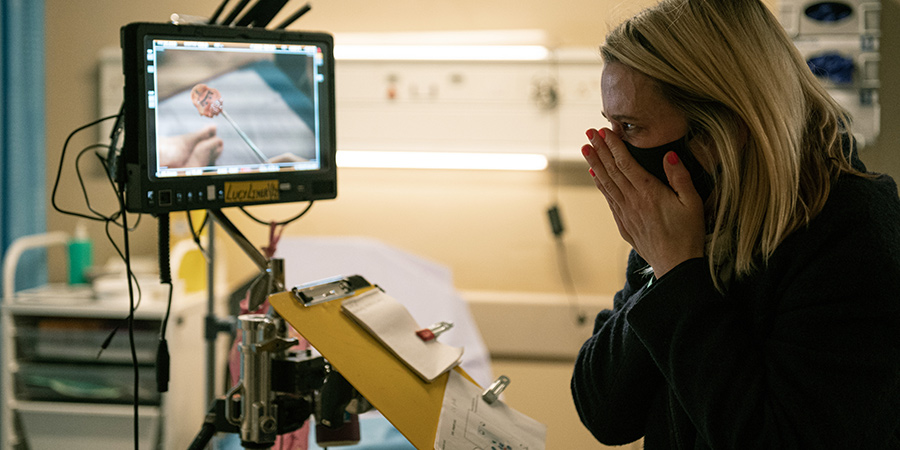
I couldn't have been prouder or more thrilled to work with this group of actors on the show. Everyone felt like they belonged. Everyone really brought their A game. And they really helped make my dream of making it feel naturalistic and authentic, a reality.
This article is provided for free as part of BCG Pro.
Subscribe now for exclusive features, insight, learning materials, opportunities and other tools for the British comedy industry.

